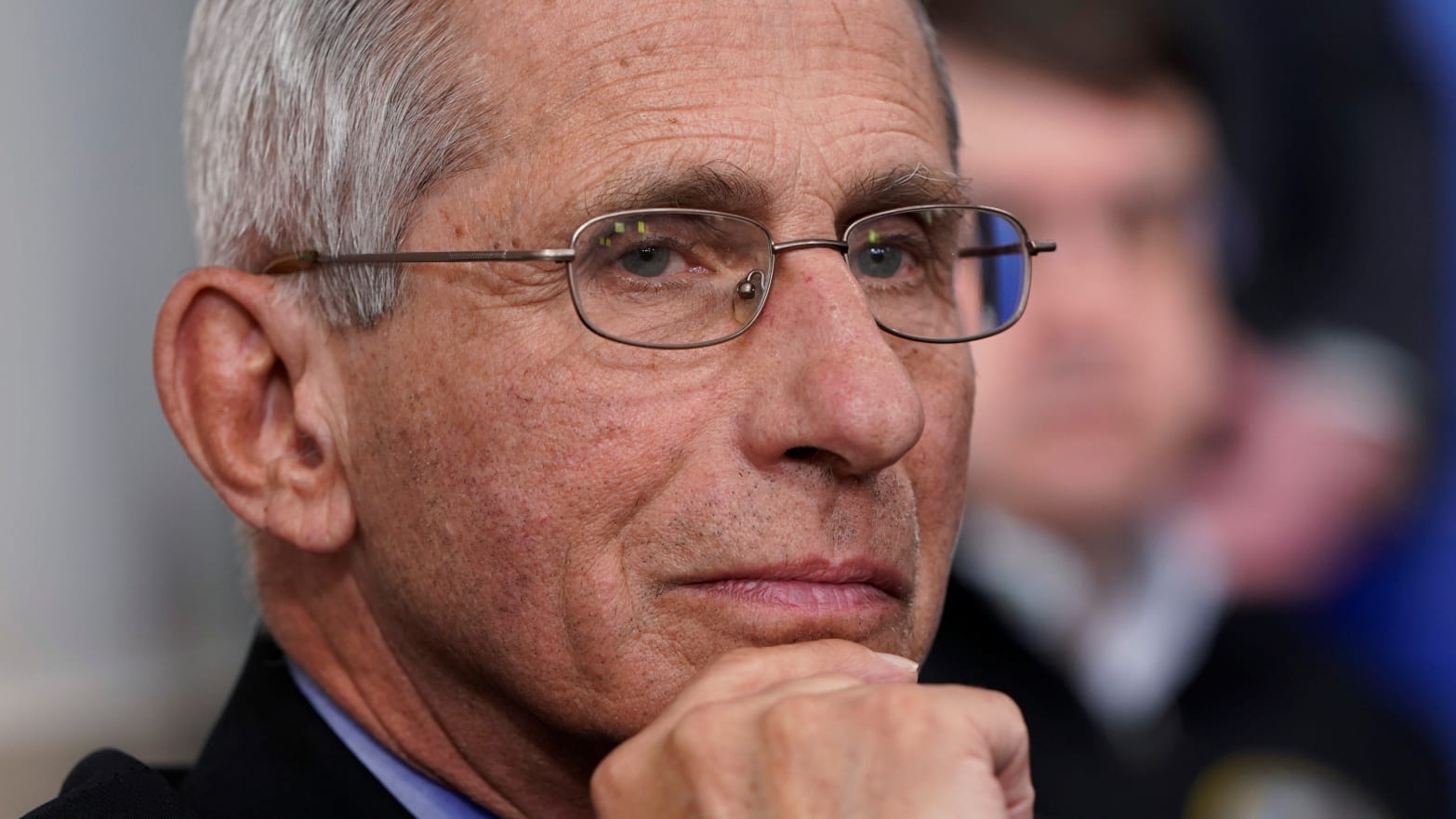As the Food and Drug Administration authorized Pfizer’s COVID-19 vaccine for emergency use on Friday, Dr. Anthony Fauci, the nation’s top infectious disease expert, was out for a walk in the dark.
“Sorry if I’m out of breath,” he said. “I’m walking. I promise I’m not having a heart attack.” He’s walking these days, he says, because his schedule has been so tightly packed in recent weeks that by the time he gets home it’s too ill-lit to run. And this day in particular has been extra draining, he says, primarily because of the anticipation that the vaccine would soon be on its way to states across the country.
Fauci, along with other top health officials in the Trump administration, has been working for months to try and fast-track a vaccine and to get doses out to the American people by the end of the year. And on Friday when we spoke, Fauci and his colleagues were prepared for good news—that the FDA would clear the Pfizer vaccine for emergency use, allowing FedEx and the U.S. Postal Service to begin preparing the vaccine for shipment to frontline health-care workers. (The FDA did exactly that one hour after I hung up the phone with Fauci). About 2.9 million doses of the vaccine will arrive in communities across the country as soon as Monday morning.
“I hope this process unfolds smoothly,” Fauci said with a sense of uneasy optimism. “I think it will. [It’s] going to be the beginning of an important era in how we’re attacking this virus.” Fauci said he has no reservations about the logistics behind the vaccine distribution plan. Operation Warp Speed, a public-private partnership to fast-track the vaccine, has for months had a plan in place to ensure the delivery of the first vaccine doses to states, he said. But all the planning the military has done to ensure the distribution process runs smoothly won’t matter if people aren’t willing to take the vaccine, Fauci said.
“My primary biggest fear is that a substantial proportion of the people will be hesitant to get vaccinated,” Fauci said. “I think there are going to be many people who don't want to get vaccinated right away. But once you get, you know, tens of millions of people vaccinated, it looks like it’s working and it’s safe, then I think we’ll win over a large proportion of the rest of the population, who might have some hesitancy about getting vaccinated.”
Vaccine hesitancy has been at the forefront of conversations between coronavirus task force members for months. In a call over the summer with the nation’s governors, a copy of which was obtained by The Daily Beast, Fauci urged state leaders to begin speaking publicly about the vaccine, the companies who were working on it, and the iron-clad process one would have to go through in order to get approval from the FDA. The more officials began to ramp up messaging about the vaccine’s safety, the better, Fauci said.
Fast forward almost four months later, though, and Fauci says he’s still worried that Americans will not show up to get immunized—even health-care workers who are set to receive the first batch of doses next week. And there’s evidence to support that fear. One hospital in Essex County, Massachusetts battling high hospitalization and community infection rates sent a survey out to staff last week asking who would be willing to take the vaccine. According to one administrator from that hospital, about a third of those surveyed said they were comfortable getting immunized.
“That’s the reason why we’ve got to make sure we get the health care workers the proper information,” Fauci said. “What is the reason that they're hesitant? They think it went too fast? It was certainly the fastest we've ever approved the vaccine. But the speed is related to the extraordinary scientific advances in platform technology from vaccines that allowed us to do things in months that would have formerly taken several years. If you give them that information and explain it clearly to them then I think they will go along with getting vaccinated. If it doesn’t, then I think we’re going to be in a little bit of trouble.”
The problem, Fauci said, is that if heaps of health-care workers choose not to take the vaccine, then the rest of the population could be hesitant to get immunized. And that would only prolong the time it would take for the country to get back on track.
“If we can get a very high percentage of the United States population vaccinated with what is clearly a group of highly efficacious vaccines, we could have a major positive impact in turning around the dynamics of this outbreak,” Fauci said. “Once you get past the priorities and get to the general population ... if we can then, you know, do a full color dress and get people really vaccinated in April, May and June … I think we can really be close to not exactly but really approaching some degree of normalcy.”
Fauci said he expected people who fall outside of the first priority tier, which includes health-care workers and nursing home staff and residents, to begin receiving the vaccine at the end of March or the beginning of April.
“People who don’t have underlying conditions or who are not elderly are not going to get it for months. That is just the reality that we have to face,” Fauci said. “So, what I say to those people is hang in there, continue to do whatever you can to protect yourself from getting infected .. and hopefully sooner rather than later, you’ll get the opportunity to get vaccinated.”
Even after people get vaccinated, Fauci said, Americans should still wear masks.
“For the simple reason that we’re not going to have a broad public health effect until we get the overwhelming majority of the people vaccinated,” he said. “So, I think we need to not abandon public health measures at all until the country as a whole is in a situation where the level of virus is so low, that it’s … very unlikely that you’re going to get infected.”
Fauci said he is going to continue spending a large portion of his work day promoting the vaccine’s safety and efficacy as a way to address vaccine hesitancy.
“At least 30 percent of my day is spent on podcasts, in fireside chats, and interviewing with people talking about the importance of getting people vaccinated,” Fauci said, adding that he’d been told that the Department of Health and Human Services had previously talked about putting together a program to address the issue. “It was supposed to be me and a few others, including Jerome Adams. I’m not sure where that stands. But this is a public relations, public messaging challenge that we're going to be faced with.”

